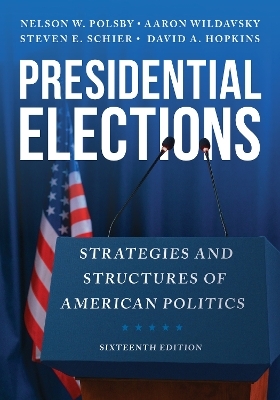
Presidential Elections
Rowman & Littlefield (Verlag)
978-1-5381-8370-0 (ISBN)
Steven E. Schier is Dorothy H. and Edward C. Congdon Professor of Political Science Emeritus at Carleton College. He is the author or editor of 23 books including The Trump Effect: Disruption and Its Consequences in US Politics and Government and Polarized: The Rise of Ideology in American Politics, both with R&L. David A. Hopkins is associate professor of political science at Boston College. He is the author of Red Fighting Blue: How Geography and Electoral Rules Polarize American Politics (Cambridge University Press), and Asymmetric Politics: Ideological Republicans and Group Interest Democrats (Oxford University Press). His political analysis has appeared in the New York Times, Washington Post, and Vox, and he is a contributing columnist at Bloomberg Opinion. Nelson W. Polsby was Heller Professor of Political Science and past Director of the Institute of Governmental Studies at the University of California, Berkeley, where he taught American politics for forty years. Aaron Wildavsky was Class of 1940 Professor of Political Science and Public Policy at the University of California, Berkeley, and founding dean of Berkeley's Graduate (now Goldman) School of Public Policy.
List of Figures, Tables, and Boxes
Preface
PART I. THE STRATEGIC ENVIRONMENT
1. VOTERS
Why People Don’t Vote
Why People Do Vote: A Theory of Social Connectedness
Party Identification as Social Identity
Parties as Aggregates of Loyal Voters
Ideologies, Issues, and National Conditions in the Minds of Voters
Changes in Party Identification: Social Habit versus Contemporary Evaluation
A Central Strategic Problem: The Attentiveness of Voters
2. GROUPS
The Presidential Vote as an Aggregation of Interest Groups
Variations among Interest Groups
“Special” Interests, Campaign Spending, and Public Interest Groups
Political Parties as Organizations
Third Parties
3. RULES AND RESOURCES
Rules: The Electoral College
Thinking About Resources
Resources: Money
Resources: Control over Information
Incumbency as a Resource: The Presidency
Incumbency as a Liability: The Vice Presidency
The Balance of Resources
PART II. SEQUENCES
4. THE NOMINATION PROCESS
Before the Voting Begins: The “Invisible Primary”
The Early States
What Do These Historical Vignettes Teach?
Super Tuesday and Later Primaries
State and Territorial Caucuses
Delegate Allocation
Superdelegates
An Ever-Changing Nomination Process
The National Party Conventions
The Convention as Advertising
The Vice Presidential Nominee
The Future of National Conventions
5. THE CAMPAIGN
The Well-Traveled Candidates
Persuading Voters
Winning the Media Game
Campaign Professionals
Televised Debates
Getting Out the Vote
Campaign Blunders
Forecasting the Outcome
Counting the Vote
PART III. ISSUES
6. APPRAISALS
Reform upon Reform
The Political Theory of Policy Government
Reform by Means of Participatory Democracy
Some Specific Reforms
Party Platforms and Party Differences
7. AMERICAN PARTIES AND DEMOCRACY
Elections and Public Policy
Parties of Advocacy versus Parties of Intermediation
APPENDIXES
A. Vote by Groups in Presidential Elections, 1984–2020
B. Voter Turnout in Presidential Elections, by Population Characteristics, 1984–2020
C. Selections from the Democratic and Republican Party Platforms, 2020
Notes
Index
| Erscheinungsdatum | 14.07.2023 |
|---|---|
| Verlagsort | Lanham, MD |
| Sprache | englisch |
| Maße | 182 x 263 mm |
| Gewicht | 798 g |
| Themenwelt | Sozialwissenschaften ► Politik / Verwaltung ► Staat / Verwaltung |
| ISBN-10 | 1-5381-8370-6 / 1538183706 |
| ISBN-13 | 978-1-5381-8370-0 / 9781538183700 |
| Zustand | Neuware |
| Informationen gemäß Produktsicherheitsverordnung (GPSR) | |
| Haben Sie eine Frage zum Produkt? |
aus dem Bereich


